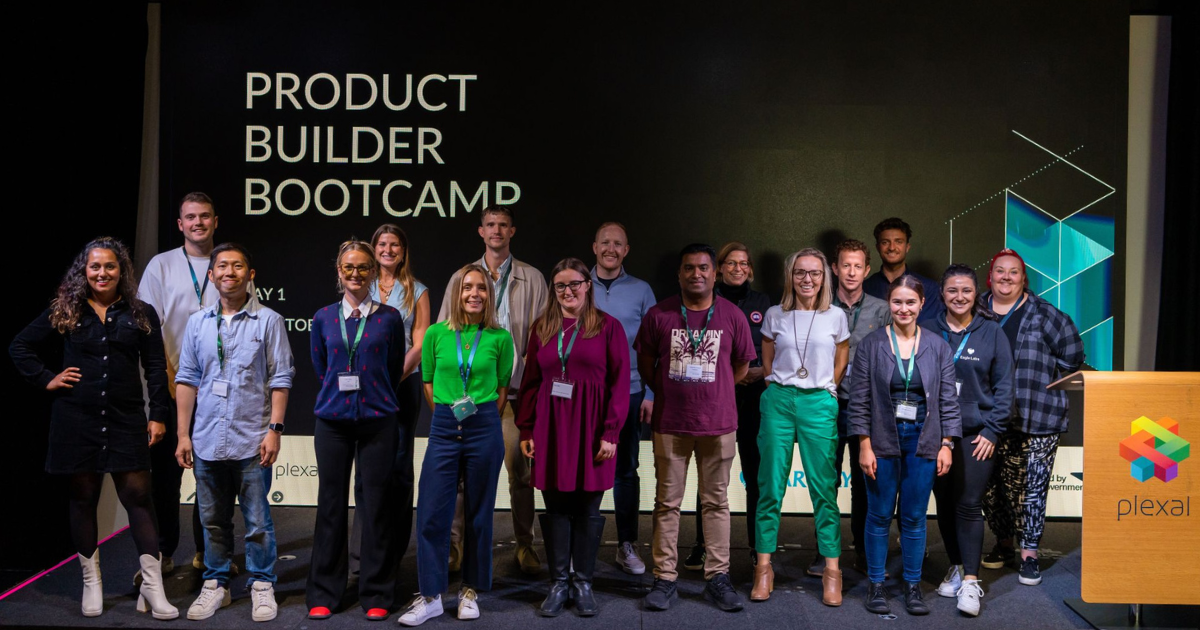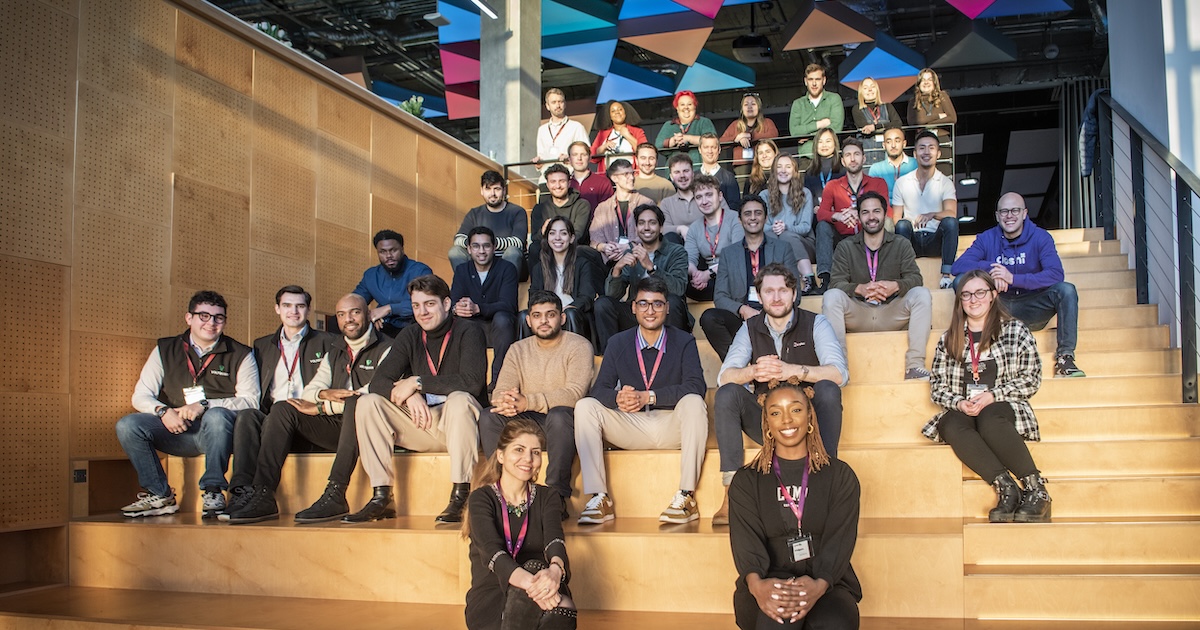In July, we officially started the engine on our Product Builder Programme, which is powered by Barclays Eagle Labs, funded by the UK government and delivered by Plexal.
Designed to fit around the busy lives of budding entrepreneurs, teaching them how to develop, test, validate and evolve a digital product, we welcomed a cohort of 100 idea-rich individuals and provided tailored guidance to help them level up over the course of three months, made up of eight weeks on the programme and the remaining time spent within the bootcamp.
From that 100, we’ve welcomed just eleven to the next stage of the programme, a Bootcamp across two days in Plexal Stratford, enabling our founders to get up close with investors including Mario Alejandro Rojas from Octopus Ventures, Matt Jonns from Founder and Lightning, and Sarah Barber and Richard Trevor from Jenson Funding Partners to pitch their ideas and acquire potential investment. And as part of the programme, we’ve connected with these budding product builders to share their stories:
Saving the energy sector from drowning in data to address environmental concerns
Sahil Singh is the mind behind terranow, along with co-founder Prageeth Krishnan, which he tells us was conceived from “the realisation that the energy sector is drowning in data but much of it remains untapped.” As a result, terranow is a platform that’s been built with an ambition of improving energy generation forecasting; a critical aspect of managing renewable energy sources.
With an academic background in economics and professional experience in data science, machine learning and other technical domains, Sahil founded terranow to improve energy forecasting accuracy using advanced analytics. Better forecasting enables efficient grid management, reducing reliance on polluting power plants.
Sahil was drawn to the Product Builder Programme for its emphasis on product design, user testing and customer journey mapping to augment his technical skills. Working on prototypes and clickable models was highly valuable to explore new facets of product development. He also appreciated the mentorship and networking element of the programme.
A key challenge was focusing terranow’s initial customer segment and geography amidst strategic startup decisions, the personalised mentor office hours helped provide clarity on Sahil’s entrepreneurial direction.
Looking ahead, Sahil aims to first launch terranow in the UK where accurate forecasting can significantly decrease greenhouse gas emissions. He also sees major potential in India’s power grid. The Product Builder Programme equipped Sahil with well-rounded expertise to turn his clean energy vision into reality.
Car sharing is the future of mobility and here’s how AI can solve a common market challenge
As a Design Engineering graduate who specialised in human-centric solutions, Hannah Knight developed an AI prototype that detects interior damage in shared vehicles for her master’s thesis. She evolved this into the startup Damage Detector which provides AI-powered automated inspections for car-sharing companies.
The car-sharing industry faces challenges ensuring vehicle cleanliness and condition since manual user photo reviews are time consuming. Damage Detector’s AI algorithms analyse user-submitted photos to instantly determine vehicle damage and cleanliness, saving companies resources while providing users immediate condition reports.
As a solo founder, Hannah leveraged her academic network and remains committed to constant iteration to refine accuracy. She acknowledges learning the many hats of branding, messaging and engagement as a technical founder as a steep learning curve.
Hannah began developing the AI model last October, the AI build concluded in June coinciding with the midsummer launch of the Product Builder Programme which her father – a member of the Plexal community – recommended as ideal for early-stage founders. It appealed to her due to the hands-on entrepreneurship training and insights.
The weekly sessions and opportunity to meet experienced executives like Plexal’s Director of Emerging Technologies, Bruno Sussat, provided valuable perspectives to shape Hannah’s product and strategy; she believes shared electric vehicles are the future beyond private petrol cars.
With a B2B partnership already underway, Hannah aims to expand across the rapidly growing car-sharing sector. Damage Detector’s automation helps this industry’s sustainability by optimising vehicle reuse and reducing waste. The Product Builder Programme set Hannah on the way to transform her academic research into an environmentally impactful startup.
Bridging the gap between foraging interest and expert education
With a background in digital marketing and corporate roles, Sorcha Egan made a career shift after starting a family. Consulting work introduced her to the tech industry, leading to projects with startups. This transition sparked an interest in foraging as a personal hobby, noticing growing social media communities rediscovering this connection to nature. “Foraging is an innate skill we have passed down through generations,” Sorcha says. “It’s about stepping away from consumerism and embracing something that’s been around for centuries.”
Sensing demand for proper foraging education, she founded Wild Larder – a marketplace connecting interested learners with verified local experts offering wild food experiences. Often people forage without having specialised knowledge to carry it out safely and sustainably. Wild Larder provides experts visibility and bookings for their niche services. Users gain access to a wealth of location-based ethical foraging experiences, from mushroom hunting to wild herb identification.
With Sorcha’s marketing experience, Wild Larder emphasises video content to showcase the transformative nature of foraging and bridging this gap helps expand an activity often viewed as old-fashioned into a modern sustainable lifestyle.
The platform is in early stages but functionally live and user testing has provided feedback to refine messaging and communicate foraging’s value. Next steps involve aligning to convey its role in trends like plant-based eating and herbalism.
Discovering the Product Builder Programme prompted Sorcha to validate Wild Larder early through user conversations versus solitary building. The Product Builder Programme bootcamp will help refine her pitch and approach to investors, mapping a strategy for future growth.
Leveraging language models to enhance meeting insights
After 12 years working as a project manager and economist at the World Bank, Austin Kilroy decided to leverage his expertise to build a solution improving team communication and cohesion. This motivation stemmed from observing ineffective meetings and suboptimal group decisions during his tenure. The result is Whispers – a tool that analyses conversations during meetings to provide real-time guidance on constructive disagreement and emotional expression. “By separating emotion from the issues at hand, Whispers encourages constructive debate,” Austin explains.
Austin has been developing Whispers for around six months, building on an idea he contemplated for years. As of now there’s a working prototype that records and examines meeting interactions for a single user. The next goal is piloting Whispers with early adopters and refining the user interface based on their feedback. After iterating the design, Austin aims to create an MVP that can generate revenue.
Whispers relies on large language models like ChatGPT for natural language processing to analyse text and identify insights, this avoided extensive machine learning development. A key learning for Austin was evading projection of his own experiences onto users. Conducting early validation interviews provided crucial perspectives into target users’ actual pain points.
Austin’s diverse professional background laid the foundations for envisioning Whispers as a solution to common meeting communication breakdowns. He’s progressing steadily from prototype to piloting to MVP, focused on quickly getting Whispers to market to capitalise on the competitive landscape. He’s enjoyed the Product Builder Programme bootcamp connecting him with pre-seed financing investors and the opportunity to gain advice on areas such as branding to accelerate his progress.
Bringing data into action to provide personalised brain health guidance
Martina Meyer Zu Selhausen’s life was upended when she fell seriously ill in 2004, receiving an autoimmune diagnosis that affected her cognition and function. After years of intensive independent research and embracing functional medicine, Martina experienced gradual recovery. This health journey led her to the realisation that Alzheimer’s could be preventable through lifestyle and nutritional changes.
Eager to make this scientific knowledge accessible, Martina launched her startup Viatitude Health in 2021. Its mission is to transform the vast amounts of unstructured data on brain health into an easy-to-use tool providing personalised guidance on reducing Alzheimer’s risk.
Originally from Germany with a background in finance, Martina sees an urgent need to reach vulnerable communities with poor nutrition habits. Viatitude Health aims to close the gap between complex research and practical application. The app asks users to complete a questionnaire identifying their specific risk factors, an algorithm then generates tailored recommendations on supplements, diet changes, or exercises to support their unique needs.
Despite the challenges Martina faced, she remains firmly devoted to empowering people to take control of their brain health. Martina hopes Viatitude Health can make a difference by making scientific knowledge digestible and actionable. Her personal health struggles sparked a mission to prevent others from similar outcomes. Her startup aims to translate data into accessible and personalised guidance to transform brain health.
Martina has found the Product Builder Programme invaluable for refining her messaging and focusing on conveying her startup’s core values. The bootcamp offered an opportunity to further polish her pitch and business structure.
On a mission to tackle the family mental health crisis
Mark Cox’s career as a doctor exposed him to the growing mental health crisis surrounding young people and families. Inspired to act, he teamed up with friend and psychologist Euan Bell last May to develop Lumi – an all-in-one digital platform for family emotional wellbeing.
Lumi provides parents with tools and guidance to support children’s mental health, taking a whole-family approach. After initial research on loneliness, the founders zoned in to address the critical role parents play in the crisis.
The platform aims to make mental health resources affordable and accessible. Subscriptions, partnerships, and additional services will follow in due course to sustain Lumi’s mission. Gaining credibility as non-mental health experts was an early obstacle, however open communication and humility to learn from professionals helped build trust in their vision.
Looking ahead, the founders aim to start content creation, along with defining subscription models and expanding their services. Piloting in schools will refine the platform to users’ needs.
Discovering Product Builder Programme through a chance connection proved fortuitous, giving Lumi refinement and acceleration. Programme highlights have been collaborating with mentors and developing an MVP.
The founders are pleased to have honed their pitch at the Product Builder Programme bootcamp and making connections for the next phase of Lumi. Their diverse income streams, including Airbnb, enable persistence in tackling this societal challenge.
Digitalising the construction industry
With over 15 years of experience as an architect, Allister Lewis noticed the construction industry lagged in adopting digital workflows. This sparked his mission to drive greater digitisation and efficiency. While pursuing his master’s focused on Building Information Modelling (BIM) management, Allister recognised the need for improved automated processes, especially for architects. He began compiling a database of construction tech solutions, eventually totaling over 700 options.
The explosion of software choices highlighted the need for a centralised marketplace. So with mentoring support in 2022, Allister founded ADDD – a platform connecting construction professionals to software vendors.
ADDD simplifies finding, demoing and purchasing construction software. It serves both buyers (architects, engineers) and sellers (software providers). Allister is currently building an MVP and has a signup page live.
Participating in the Product Builder Programme has provided valuable founder connections, pitch coaching and tech guidance. Allister aimed to develop an 18-month roadmap and refine his pitch at the bootcamp. Having to quickly upskill in many startup domains like funding, marketing and development has been challenging, but support from the programme delivery team has enabled Allister to tackle these areas.
With construction ripe for digitisation, ADDD can make procuring innovating software solutions seamless. Allister’s domain expertise and database of options positions him well to launch this marketplace.
Making the workforce work for women returners
Sister duo Amelia and Lydia Miller co-founded Ivy after witnessing the employment struggles their mother faced when trying to return to work after a 15-year career break raising them. They recognised similar bias and barriers hindering millions of women globally when re-entering the workforce post-career break.
Ivy aims to tackle this issue through an online platform connecting women returners with employers actively seeking their unique skills. It allows women to create comprehensive profiles akin to augmented CVs, highlighting competencies gained through parenting and homemaking.
Ivy also provides returnships, upskilling courses and an algorithmic matching system to showcase candidates’ fitness and close perceived skills gaps. For employers, Ivy expands and diversifies their candidate pool.
Currently partaking in Product Builder Programme, Amelia and Lydia have validated the market need through extensive customer research. They are poised to build an MVP and commence fundraising after bringing on a technical co-founder.
Despite challenges and self-doubt, the founders’ shared vision empowers them to persist. Ivy represents a chance to positively impact women’s lives by transforming outdated societal attitudes on career breaks.
Centralising support for an underserved community
Lydia Carrick founded Apputee after her father lost his leg in a 2016 motorbike accident. Struggling to find helpful resources during his recovery highlighted the need for a centralised platform to guide amputees.
Apputee is an app delivering key information and support throughout the limb loss journey. It provides a curated collection of resources like prosthetist directories, product reviews, and lifestyle tips. The stage-based guidance dynamically adapts as users progress.
With 12 years of marketing experience, Lydia founded Apputee while completing a pandemic-inspired entrepreneurship course. Validating the concept, she applied for the Product Builder Programme to transform the idea into an MVP.
Imposter syndrome has been Lydia’s biggest challenge as a solo founder, however connecting with fellow early-stage founders has helped overcome self-doubt and she is gaining confidence through learning by doing.
Lydia is eager to put Apputee into users’ hands and make an impact. Her ambition has been to refine the Apputee pitch at the Product Builder Programme bootcamp and she’s loved being inspired by her fellow founders. Apputee represents a personal mission for Lydia to help amputees navigate recovery. Her own family’s struggles sparked a drive to fill the resource gap through one consolidated and supportive platform.
Transforming fitness for a mature audience
Watching her grandmother struggle with declining health and inactivity, fitness professional Rosaria Barreto recognised the lack of exercise options tailored for the over-60 demographic. This inspired her to found Mature Movers – an online marketplace matching older adults to vetted local activity providers.
With a background in personal training and experience running her own fitness business, Rosaria saw demand skyrocket during the pandemic. Managing overwhelming client requests highlighted the need for greater accessibility. Mature Movers provides the solution via its network of specialised, vetted instructors offering classes catering to older populations.
Currently finalising provider onboarding, Rosaria hopes to officially launch with 50 services and 100 founding members. Self-doubt and financing have been key challenges, but she’s persevered through bootstrapping, fundraising and personal sacrifices.
Rosaria is eager to refine her pitch at the upcoming Product Builder bootcamp. Meeting fellow founders fuels her drive, as each new connection expands her odds of meeting a potential investor.
At its core, Mature Movers fulfills Rosaria’s personal mission to shatter misconceptions around aging and create inclusive fitness resources for older adults. Her experience empowers her to make exercise accessible for all ages and abilities.
Streamlining sales in the digital age through connecting buying and selling teams
With ten years’ experience in software sales, Adam Barcroft observed a radical shift in how buyers interact with salespeople, severely impacting sales cycles. Working at Salesforce, it was clear even industry giants struggled to meet buyer expectations with inward-facing sales tools.
Along with co-founder Kevin Chua, a tech entrepreneur, the duo founded Launchdeck – a SaaS platform bringing B2B buying and selling teams together in personalised digital deal rooms. This meets the changing preferences of modern buyers.
Launchdeck removes noise from fragmented communications like complex email chains and unproductive Zoom meetings. Digital deal rooms ensure all stakeholders stay aligned on deals in one workspace, optimising collaboration and sales velocity.
Currently working towards an MVP, Launchdeck has engaged users ready for initial testing. This aligns with their product roadmap before full launch in November.
The Product Builder Programme benefited Launchdeck through investor conversations and networking. Founder Adam Barcroft highlights how the structured weekly approach helped position and communicate their solution in a compelling way.
Our Product Builder Programme with Barclays Eagle Labs equipped these founders with invaluable skills to transform ideas into viable digital products. From refining pitches to launching MVPs, participants gained practical insights, mentoring, and connections to accelerate their startups. While each founder’s journey and offering are unique, they share an empowering experience of turning passions into purpose-driven businesses. We look forward to witnessing how these talented entrepreneurs continue impacting their industries, customers, and society at large, using our programme as a launchpad to grow their business.


